Identity theft even applies to the dead. Write your obituaries with identity theft in mind because the deceased’s identity is an irresistible target for thieves. There are tips that you can follow to avoid identity theft.
Victims of identity theft
Identity theft of the dead is a deplorable topic to have to discuss, but it must be talked about to help those who may be victims of identity theft in the future. The problem is compounded by the fact that the family is grieving for the dead and being conned at the same time. It is made even worse when the deceased had joint accounts with a partner who is still living because she or he ends up having to pay dearly for the thief’s crimes. The saddest part is that the thief often gets away with the crime before he or she is caught.
Identity theft from obituaries
Con artists will scan the obituaries in their city or town and watch for valuable information that they can use to access bank accounts and personal credit. Long obituaries that give many details give these scam artists more valuable information that they can use to steal the identity of the deceased. The deceased doesn’t have to worry about their credit rating, but the family is caused undue emotional stress. Sometimes the thieves want to steal the identity to avoid immigration, legal or financial problems of their own.
How you can avoid identity theft
The best way to avoid identity theft from your loved ones obituary is to take care of financial and credit issues before the obituary is published. Close accounts, and notify all creditors, banks and credit reporting agencies of the deceased’s passing. The next best thing is to limit the information on the obituary so that there isn’t a resume of details that list every occupation, award and detail of the person’s life.
A checklist of what to do to avoid identity theft from obituaries
If you do all of these things you will ensure that your loved one will not be a victim of identity theft after he or she has passed away. It is even better if you do all of this before you publish the obituary:
Close accounts and credit cards.
Notify Equifax, Trans Union and Experian of the deceased’s passing.
Contact Social Security and have them deactivate the social security number of the deceased.
What to do if you suspect identity theft
If you’ve already published the obituary and you notice unusual activity on the deceased’s accounts, you can assume there is some sort of identity theft and so you must do the following:
Notify the police immediately.
Contact your bank and freeze accounts.
Contact credit-reporting agencies.
The police and credit reporting agencies will have more suggestions for you to keep you safe.
Writing obituaries need not be a daunting task, especially if you have all your financial affairs in order. If you’ve taken all the steps to avoid identity theft from obituaries, you can rest assured that your obituary can be as long or as short as you would like it to be.
Melanie Walters recommendshttps://www.quickfuneral.com/ for Newspaper Obituaries, free genealogy resources, guides to building a family tree, sample letters of sympathy and condolence, written examples of eulogies as well as help with all aspects of funeral planning.
Funeral Program Templates
-
Searching for a White Roses And Black Ribbon Funeral Program Template that is easy to print and has a cutting-edge look? White Roses And Black Ribbon Funeral Program Template is the Perfect decision because it measures 8.5”x 11”.
- No Limitation on Content, Edit anything
- Edit anytime – unlimited revisions even after purchased
- Get a printable PDF downloaded to get it printed on your own
-
Searching for a Realistic Burning Candle Funeral Program Template that is easy to print and has a cutting-edge look? Realistic Burning Candle Funeral Program Template is the Perfect decision because it measures 8.5”x 11”.
- No Limitation on Content, Edit anything
- Edit anytime – unlimited revisions even after purchased
- Get a printable PDF downloaded to get it printed on your own
-
Searching for a Bulltongue Arrowhead Funeral Program Template that is easy to print and has a cutting-edge look? Bulltongue Arrowhead Funeral Program Template is the Perfect decision because it measures 8.5”x 11”.
- No Limitation on Content, Edit anything
- Edit anytime – unlimited revisions even after purchased
- Get a printable PDF downloaded to get it printed on your own
-
Searching for a Grey Floral White Tiny Flower Funeral Program Template that is easy to print and has a cutting-edge look? Grey Floral White Tiny Flower Funeral Program Template is the Perfect decision because it measures 8.5”x 11”.
- No Limitation on Content, Edit anything
- Edit anytime – unlimited revisions even after purchased
- Get a printable PDF downloaded to get it printed on your own
-
Searching for a Red Flower Dark Soil Funeral Program Template that is easy to print and has a cutting-edge look? Red Flower Dark Soil Funeral Program Template is the Perfect decision because it measures 8.5”x 11”.
- No Limitation on Content, Edit anything
- Edit anytime – unlimited revisions even after purchased
- Get a printable PDF downloaded to get it printed on your own
-
Searching for a Pink Rose Frame Floral Oval Badge Funeral Program Template that is easy to print and has a cutting-edge look? Pink Rose Frame Floral Oval Badge Funeral Program Template is the Perfect decision because it measures 8.5”x 11”.
- No Limitation on Content, Edit anything
- Edit anytime – unlimited revisions even after purchased
- Get a printable PDF downloaded to get it printed on your own
-
Searching for a Brown and White Classic Funeral Program Template that is easy to print and has a cutting-edge look? Brown and White Classic Funeral Program Template is the Perfect decision because it measures 8.5”x 11”.
- No Limitation on Content, Edit anything
- Edit anytime – unlimited revisions even after purchased
- Get a printable PDF downloaded to get it printed on your own
-
Searching for a Purple Elegant Watercolor Funeral Program Template that is easy to print and has a cutting-edge look? Purple Elegant Watercolor Funeral Program Template is the Perfect decision because it measures 8.5”x 11”.
- No Limitation on Content, Edit anything
- Edit anytime – unlimited revisions even after purchased
- Get a printable PDF downloaded to get it printed on your own
-
Searching for a Cream and Green Photo Obituary Program that is easy to print and has a cutting-edge look? Cream and Green Photo Obituary Program is the Perfect decision because it measures 8.5”x 11”.
- No Limitation on Content, Edit anything
- Edit anytime – unlimited revisions even after purchased
- Get a printable PDF downloaded to get it printed on your own
-
Searching for a Cream Simple Elegant Photo Church Program that is easy to print and has a cutting-edge look? Cream Simple Elegant Photo Church Program is the Perfect decision because it measures 8.5”x 11”.
- No Limitation on Content, Edit anything
- Edit anytime – unlimited revisions even after purchased
- Get a printable PDF downloaded to get it printed on your own
-
Searching for a Grey Classic Minimalist Funeral Program Template that is easy to print and has a cutting-edge look? Grey Classic Minimalist Funeral Program Template is the Perfect decision because it measures 8.5”x 11”.
- No Limitation on Content, Edit anything
- Edit anytime – unlimited revisions even after purchased
- Get a printable PDF downloaded to get it printed on your own
-
Searching for a White Classic Funeral Program Template that is easy to print and has a cutting-edge look? White Classic Funeral Program Template is the Perfect decision because it measures 8.5”x 11”.
- No Limitation on Content, Edit anything
- Edit anytime – unlimited revisions even after purchased
- Get a printable PDF downloaded to get it printed on your own


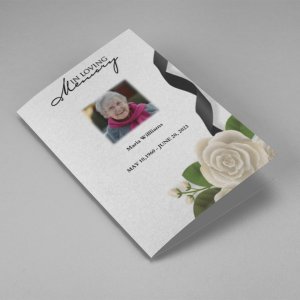
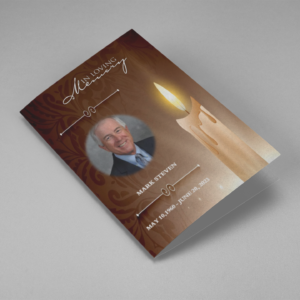




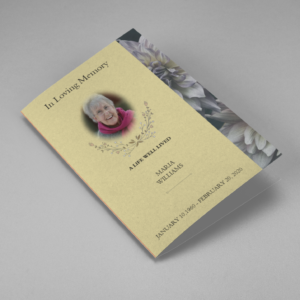
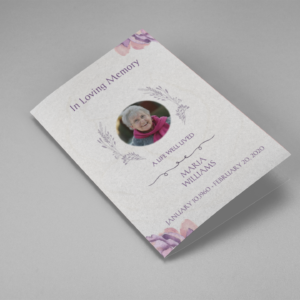
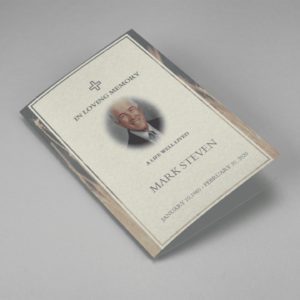
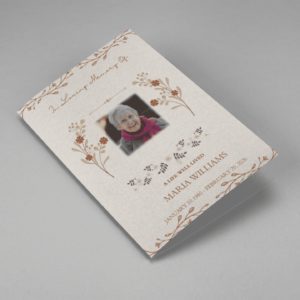
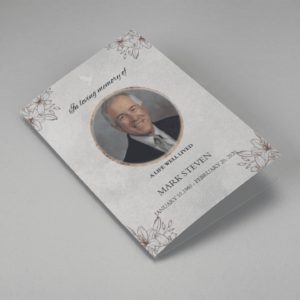
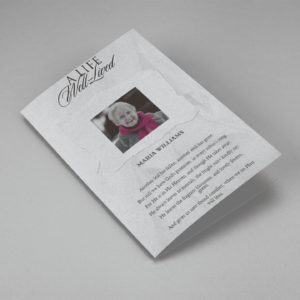
Leave a Reply
You must be logged in to post a comment.